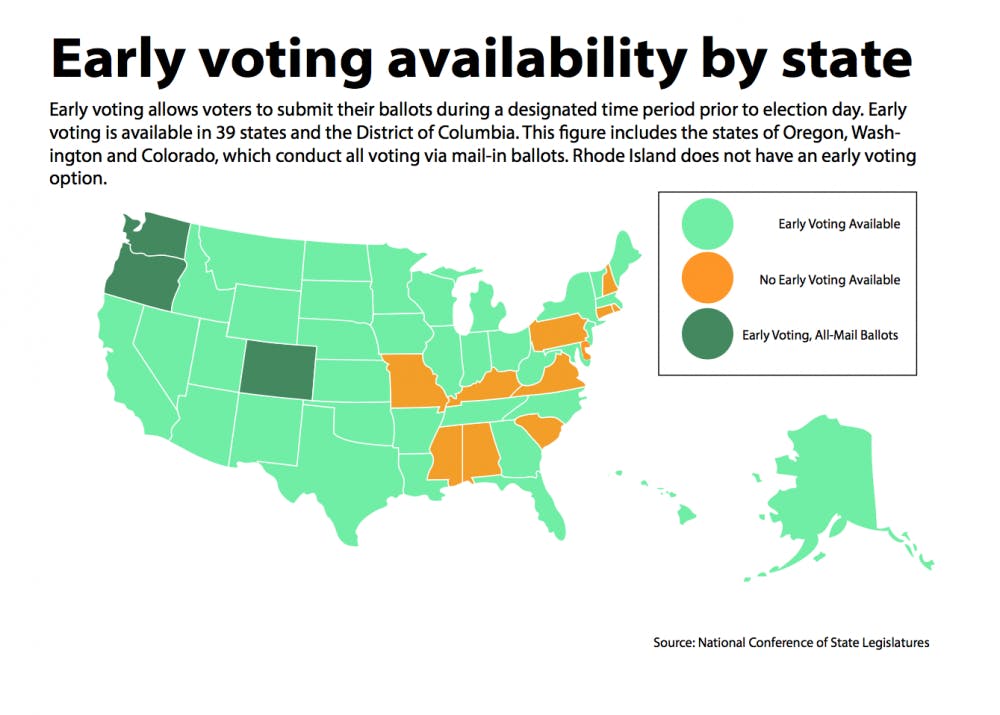Rhode Island Secretary of State Nellie Gorbea has proposed a system for early voting in the Ocean State.
House Bill 5292, which was introduced and referred to the House Judiciary Committee Feb. 6, would open polls 20 days before a primary or general election and would allow local municipalities to determine where voting takes place in their jurisdictions. The bill was introduced by state representatives Joseph Solomon D-Warwick, Christopher Blazejewski D-Providence, Jean Barros D-Pawtucket, Robert Phillips D-Woonsocket and Cumberland and Bernard Hawkins D-Smithfield and Glocester. Department of State Communications Director and Senior Advisor Nicole Lagace expects an identical bill to be introduced in the Senate, she wrote in an email to The Herald.
This bill is consistent with a wider effort of Rhode Island officials working to increase voter access in the state. State Senator Gayle Goldin, D-Providence proposed voting reforms last month, which include measures to repeal the state’s voter ID laws, The Herald previously reported. Unlike Rhode Island, 39 states and the District of Columbia already have a system in place for early voting. Gorbea has sought to enact progressive voting reforms for years. This is the fifth time Gorbea has tried to pass early in-person voting, Lagace wrote.“There is no silver bullet to increasing voter turnout, but implementing early in-person voting is an important step to improving access to the ballot box,” Lagace wrote.
Beyond increasing voter participation, Gorbea hopes to make election day more manageable for administrators by shifting some of the voting traffic from mail ballots to early in-person voting. From 2014 to 2018, the Board of Elections saw emergency mail ballot use increase by 119 percent, and the number of regular mail ballots rise by 47 percent. Without this reform, election officials will not be able to keep pace with the excessive reliance on mail ballots, said John Marion, executive director for Common Cause Rhode Island.
“Without the legislature creating a system of early voting, we’re going to be in a crisis in 2020 because voters are increasingly using mail ballots … and it’s overwhelming the election administration,” Marion said. He added that failure to address this mail ballot increase could ultimately disenfranchise voters.
H 5292 would not change the mail ballot system, as voters could still request an emergency mail ballot three weeks before election day and those who are unable to go to their polling place would still have access to emergency ballots.
Previous efforts to ensure early voting have failed due to concerns over increasing costs for local municipalities, which would have to support early voting infrastructure. Gorbea’s office has worked with state and local officials “to address issues that have been raised,” Lagace wrote. “We reduced the numbers of weekends and hours (from previous proposals). We also added the actual machine voting process to the bill to reduce some of the administrative challenges.”
Gorbea’s office has also been working on a separate initiative to change the date that the state holds its primary election from September to “the third Tuesday after the first Monday in August,” Lagace wrote. This would allow overseas citizens and members of the military additional time to choose a candidate between primaries and general elections. According to federal law, states must send in military and overseas ballots 45 days in advance of the general election. As the 2020 election dates currently stand, Rhode Island would risk violating the law, Lagace wrote.
“The single act of casting a ballot is fundamental to our democracy and critically important to making government accountable to the people it serves,” Gorbea wrote. “That’s why I continue to make it a priority that elections in the state are accessible to all eligible Rhode Islanders and that the voting experience is smooth and without delay.”
The Brown Progressive Action Committee supports any reform that increases voter participation, said Jenna Israel ’21, co-chair of BPAC. The group has been working with Common Cause Rhode Island to institute early voting in-person in the state. Without an early voting system, “it makes it really hard for a lot of people to be able to vote,” she said, adding that the system would “make it easier for municipalities to process votes.”
The Rhode Island Board of Elections plans to sponsor its own bill to enact early voting, though it endorsed Gorbea’s legislation last year. The Rhode Island Board of Elections did not respond to request for comment.
Marion also advocates same-day voter registration. Currently, the state constitution requires voters to register 30 days before an election. But the Secretary of State is considering a referendum on the ballot for the next general election, which she can include without the proposed change earning a supermajority in both chambers because the General Assembly has not considered this specific change in the past 10 years.
“Until we attack that, we’re probably not going to see a dramatic increase in turnout,” Marion said. “Early voting might provide a little bump … but the big gains would come in same-day registration.”





